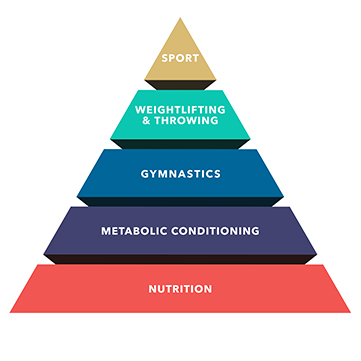
Today’s blog post is by Alyssa Altschul, CrossFit Hardwired member and Pn1 Certified Nutrition Coach.
Eating well isn’t just important for dieting and losing weight. Most of us are spending several hours each week working out to be healthier and happier versions of ourselves. Whether we’re at home in quarantine or in the gym when times are “normal”, fueling our bodies properly is just as important as the workouts. This will help us to be able to maximize the results of our workouts and recover well. If you want to feel an increase in your endurance during a hard cardio workout, see some gains on your lifts, feel more energized and less sore for the next day’s workout, or finally get that movement you’ve been working on, check out the tips below to find out how to use your nutrition to help you get the most from your workouts!
Getting plenty of micronutrients and vegetables.
Micronutrients (vitamins, nutrients, and minerals) are needed for all our bodies’ processes. You have likely heard a lot about macronutrients (carbohydrates, fats, and protein), but micronutrients are the foundation for EVERYTHING we do and need. We get micronutrients through all of our food, and certain foods will be richer in micronutrients than others. The best thing we can do is get a variety of micronutrients by eating a wide variety of fruits, vegetables, meat (if you eat meat), legumes, nuts, seeds, quality grains, dairy, etc., depending on the “diet” you follow. Eating less processed and more whole foods is what we should strive for, when we can, to maximize the nutritional value of our food. Try to avoid getting in the habit of eating the same thing all the time. While this can be helpful for routine and ease, your body would benefit more by switching things up. This is especially true with vegetables—try to “eat the rainbow” and aim to get a good variety. Also try to add in vegetables with all of your meals, or add them in for snacks in between meals.
Eating properly post-workout to help recover well.
After our workouts, it’s important to make sure to get in a good amount of protein which will aid in the processes that build our muscles. This could be in the form of a protein shake immediately after your workout, but it could also be protein from real food once you get home from the gym. Protein is crucial for helping your muscles grow, repair, and recover.
Consuming carbohydrates after our workouts will help restore the glycogen our bodies use as fuel during our workouts, which we need to replenish for optimal muscle recovery. Our bodies will “make the most” of carbs if we have them closer to our workouts. “Complex carb” choices are what we are looking for here. These digest slower and will help keep you fueled. Think potatoes, whole or sprouted grains, beans, squash, etc. If you are going to have faster digesting, sugary carbs, it would be best to have them shortly after your workout as opposed to other times of the day.
Aim to eat within one or two hours after your workout for optimal recovery and benefits. Workout in the morning? Head home and eat some eggs and chicken sausages with a side of potatoes or oatmeal. Workout in the evening? How about some chicken, green vegetables, and sweet potatoes.
Eating enough!
This one is really common. Most people think they are eating too much, but often it’s the opposite. I see this a lot, especially in those new to CrossFit. Lifting weights and doing CrossFit style workouts takes a lot out of us and burns a ton of calories! We need to make sure we are giving our bodies enough fuel to use for these tough workouts and for our everyday lives. Find out what your caloric needs are and try out a week or two of tracking your food intake. Even if you don’t want to track your intake long-term, it’s helpful to do this to get a baseline idea of how much or how little you’re eating.
Staying hydrated.
When we workout we sweat (duh!), and when we sweat we lose some of the important nutrients and minerals our body needs. If we aren’t properly hydrated, we may experience cramping, fatigue, headaches, overall poor recovery after workouts, and even changes in our mood. Drinking adequate plain water before, after, and during workouts is good, but you could also consider adding in electrolytes that you won’t get from water alone. Instead of sugary sports drinks like Gatorade, try some electrolyte supplements that don’t have all the added sugar. Grab a FitAid from the cooler at the gym, or dissolve a Nuun tablet into your water. There are plenty of other electrolyte powders and tablets out there too. Another option, less attractive for some, is to add a pinch of sea salt to your water occasionally. Working out while properly hydrated will give you more energy to perform during the workout, and staying hydrated after will help your body and muscles recover.
Following these general tips will help put you in the right direction for performing your best in the gym. They can also be adjusted depending on your specific goals (fat loss versus muscle gain, etc.). If you have questions on how to apply any of these tips or to find out more about how to customize your nutrition for your specific goals, visit www.practicalchangenutrition.com or message @practicalchangenutrition on Instagram or Facebook!
Alyssa Altschul
Pn1 Certified Nutrition Coach & Owner of Practical Change Nutrition, LLC